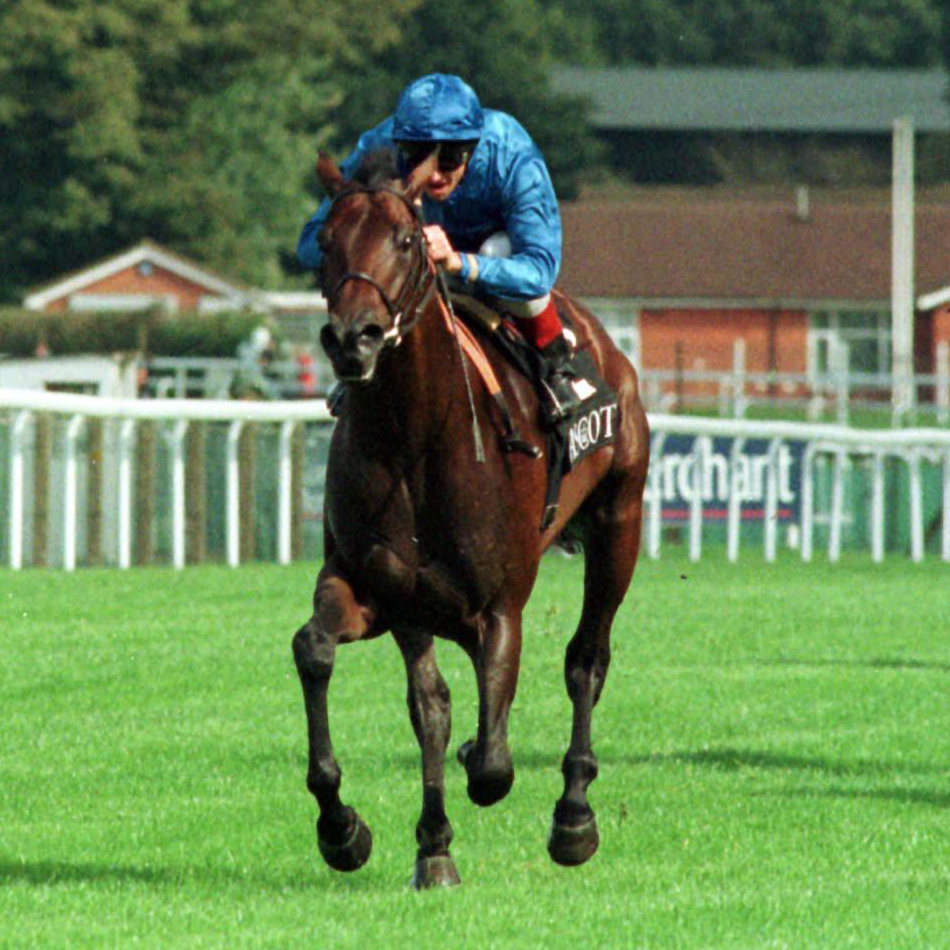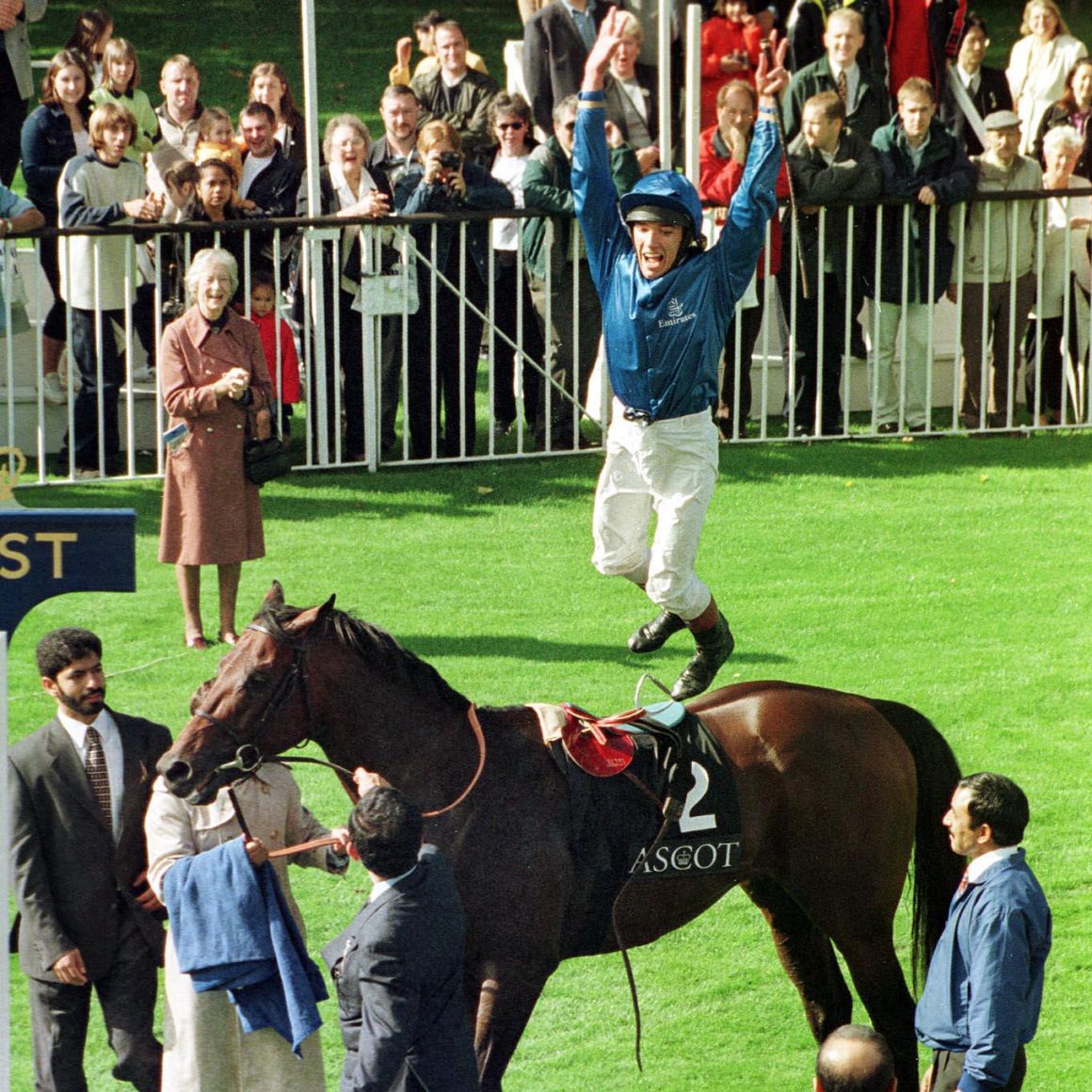Dubai Millennium
Horses have long enchanted Sheikh Mohammed but none have captured his heart quite like Dubai Millennium. Racing fans were similarly beguiled and have voted him into the QIPCO British Champions Series Hall Of Fame.
Like Hall of Famers before him, Dubai Millennium was blessed with powers that set him apart. In addition to his fine physique, high cruising speed and potent turn of foot, he was the rarest of animals: a champion on both turf and dirt. He was unbeatable at up to a mile and a quarter and would have surely gone on to scale even greater heights had injury not cut short his career.
His only defeat in ten races came in the Derby at Epsom in 1999, when he trailed home ninth after going off favourite. That deflating day for all involved with him was to be erased by a succession of subsequent breathtaking wide-margin victories.
Born at Dalham Hall Stud on the outskirts of Newmarket in 1996, he was originally called Yaazer, which translates as white gazelle, but the Sheikh had a change of heart when his young horse began showing abundant promise. The ruler of Dubai decided to name him in celebration of his home country and the upcoming year 2000.
Dubai Millennium was trained by David Loder as a juvenile and made his debut in a backend maiden in the Sheikh’s maroon and white silks over a mile on soft ground at Yarmouth in 1998. Conditions proved too much for many of the 18 runners but those who supported the 4/9 favourite never had an anxious moment as he breezed to an effortless five-length victory under Frankie Dettori.
Loder explained afterwards that Dubai Millennium’s debut had been delayed by a few niggly problems and that his outing at the seaside track was merely to “get a run into him”. Timeform observed that “there was no better performance by a two-year-old in a maiden all season”.
Transferred to Godolphin and Saeed bin Suroor, he spent the winter in the warmth of Dubai before picking up from where he left off back on British shores. He made all for a nine-length win in a minor event over a mile at Doncaster before coming from last to first in the Predominate Stakes over an extra two furlongs at Goodwood.
Those triumphs fuelled hopes he could win the Derby at Epsom and a swift break from stall 2 enabled him to get a prominent early position. However, he raced keenly in the early stages and then got shuffled back before failing to pick up in the home straight as Oath, trained by Henry Cecil, bounded to glory.
Dubai Millennium would never again run over a mile and a half and swiftly put that reverse behind him. He was not extended to make all in the Group 2 Prix Eugene over a mile and a quarter at Maisons-Laffitte the following month and four weeks later made his Group 1 breakthrough when galloping his rivals into submission in the Jacques le Marois over a mile at Deauville. On his final start of the season, he was kept to a mile and sauntered to a six-length success in the Queen Elizabeth II Stakes on heavy going at Ascot.
He was kept in training at 4, with Sheikh Mohammed’s ambitions for him including the Dubai World Cup and Breeders’ Cup Classic. Half of that vision was to be realised.

Any notion that Dubai Millennium would not be as effective on dirt were quashed when he easily won a rehearsal (the Al Maktoum Challenge) for the Dubai World Cup at Nad Al Sheba in early March. Just over three weeks later he was a spectacular six-length winner of what was then the world’s richest race.
Dettori was more a less a passenger as his partner led early on and relentlessly zoomed clear. The track record was lowered by nearly half a second and his jubilant jockey hailed him “as the best I’ve ever ridden”.
It should have been no surprise that Dubai Millennium would devour the dirt. After all, his American sire Seeking The Gold had shown high-class form on the surface, including when runner-up to Alysheba in the 1988 Breeders’ Cup Classic, and he himself was a son of USA super stallion Mr Prospector. His dam, Colorado Dancer, owned by the Sheikh, had been a pattern winner for Andre Fabre over middle distances in France.
Dubai Millennium was given a three-month break before reappearing in the Prince of Wales’s Stakes on fast ground at Royal Ascot. He had a new jockey, the American ace Jerry Bailey, as Dettori was recuperating after being involved in a plane crash earlier that month.
The top-class French challenger, Sendawar, was marginally preferred in the betting and stalked Dubai Millennium until half a mile from home. But then Bailey gave his partner a squeeze and he accelerated clear to win by eight lengths. It was another jaw-dropping display that resulted in his official rating rising to 136. He had cemented his place among the greats.
Sheikh Mohammed said afterwards: “You can wait 20 years and never get a horse like this. I have never seen or owned a horse like him, the way he trains, the way he looks. He is quite outstanding.”
The aftermath included excited talk of a big-money match race with Montjeu, winner of the Prix de l’Arc de Triomphe and King George. However, hopes for that fantasy clash evaporated on August 5 when Dubai Millennium broke his hind leg in a routine workout on the gallops.
Dr Dan Hawkins, chief surgeon at the Sheikh’s Dubai Equine Hospital, was flown to Newmarket to operate on the stricken star. The five-and-a-half-hour surgery was a success, with the Sheikh staying at his horse’s side throughout.
Dubai Millennium’s second career as a stallion began early the following year but tragedy struck in late April when he contracted grass sickness. Three operations to save him were in vain and he was euthanised whilst still under anaesthetic on April 29.
The story was not over. His first crop of just 56 foals included a diminutive colt called Dubawi, who would go on to be among the best of his generation before establishing himself as one of the world’s most revered stallions. To date, he has had more than 180 Group winners – 59 at Group 1 level – and liaisons with the now 22-year-old still cost £350,000.
Dubai Millennium was a sensation on turf and dirt. And his legacy lives on.

March 20, 1996: Born at Dalham Hall Stud on the outskirts of Newmarket. Originally called Yaazer, he is eventually named Dubai Millennium.
October 28, 1998: Dazzling winner of his only race as a two-year-old at Yarmouth.
June 5, 1999: Goes off favourite for the Derby at Epsom but trails home ninth. It proved to be the only defeat in his ten-race career.
August 15, 1999: Strikes at Group 1 level for the first time when landing the Jacques le Marois over a mile at Deauville.
September 26, 1999: Eases to a six-length success in the Group 1 Queen Elizabeth II Stakes at Ascot.
March 25, 2000: Gains a spectacular six-length triumph in the Dubai World Cup in a record time at Nad Al Sheba.
June 21, 2000: Returns to British shores and pummels the opposition in the Prince of Wales’s Stakes at Royal Ascot.
August 5, 2000: Breaks a hind leg on the gallops. Surgeons save him after a lengthy operation.
February 2001: Begins his second career as a stallion and his early progeny include Dubawi, who has since gone on to become one of the world’s most successful stallions.
April 29, 2001: Dies after contracting grass sickness. He is buried at Dalham Hall Stud.

